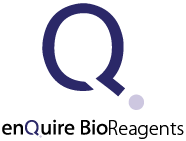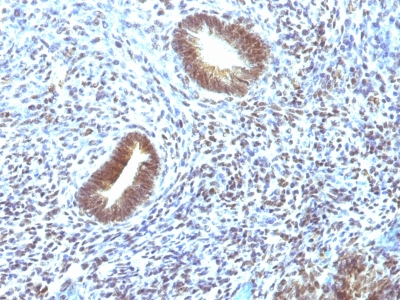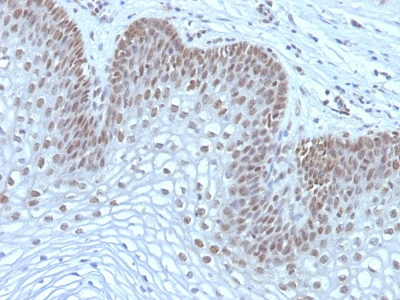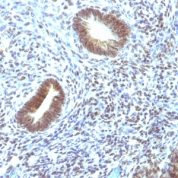Human Anti-MAP3K1 Antibody Product Attributes
Species: Human
Tested Applications: Flow Cytometry, Immunofluorescence, Western Blot, Immunohistochemistry (IHC).
Application Notes: Flow Cytometry (0.5-1ug of antibody/million cells in 0.1ml), Immunofluorescence (1-2ug of antibody/ml), Western Blot (0.5-1ug of antibody/ml), Immunohistochemistry (IHC) (Formalin-fixed) (0.5-1ug of antibody/ml for 30 minutes at RT)
Clonality: Monoclonal
Anti-MAP3K1 Antibody Clone: 2F6
Clone 2F6 Host and Isotype: Mouse IgG2a kappa
Anti-Human MAP3K1 Positive Control Sample: A431, HeLa or HL-60 cells or liver tissue.
Cellular Localization of Antibody <2F6 Staining: Cytoplasmic
Buffer and Stabilizer: 10mM PBS with 0.05% BSA & 0.05% azide.
Antibody Concentration: 200ug/ml
Antibody Purification Method:Protein A/G Purified
Immunogen: Partial recombinant MAP3K1 (aa1211-1310) (SKNSMTLDLNSSSKCDDSFGCSSNSSNAVIPSDETVFTP-VEEKCRLDVNTELNSSIEDLLEASMPSSDTTVTFKSEVAVLSPEKAENDDTYKDDVNHNQK)
Storage Conditions: Store at 2 to 8° C (refrigerate). Stable for 24 months when properly stored.
MAP3K1 Previously Observed Antibody Staining Patterns
Observed Subcellular, Organelle Specific Staining Data:
Anti-MAP3K1 antibody staining is expected to be primarily localized to the cytosol.Observed Antibody Staining Data By Tissue Type:
Variations in MAP3K1 antibody staining intensity in immunohistochemistry on tissue sections are present across different anatomical locations. An intense signal was observed in decidual cells in the placenta, exocrine glandular cells in the pancreas, glandular cells in the adrenal gland, cervix, uterine, colon, duodenum, parathyroid gland and thyroid gland, hepatocytes in liver, macrophages in lung, myocytes in heart muscle, non-germinal center cells in the tonsil and respiratory epithelial cells in the bronchus and nasopharynx. More moderate antibody staining intensity was present in decidual cells in the placenta, exocrine glandular cells in the pancreas, glandular cells in the adrenal gland, cervix, uterine, colon, duodenum, parathyroid gland and thyroid gland, hepatocytes in liver, macrophages in lung, myocytes in heart muscle, non-germinal center cells in the tonsil and respiratory epithelial cells in the bronchus and nasopharynx. Low, but measureable presence of MAP3K1 could be seen inadipocytes in mesenchymal tissue, bile duct cells in the liver, endothelial cells in the cerebral cortex, follicle cells in the ovary, glial cells in the cerebral cortex and hippocampus, myocytes in skeletal muscle, ovarian stroma cells in the ovary, peripheral nerve in mesenchymal tissue, pneumocytes in lung, smooth muscle cells in the smooth muscle and squamous epithelial cells in the oral mucosa. We were unable to detect MAP3K1 in other tissues. Disease states, inflammation, and other physiological changes can have a substantial impact on antibody staining patterns. These measurements were all taken in tissues deemed normal or from patients without known disease.Observed Antibody Staining Data By Tissue Disease Status:
Tissues from cancer patients, for instance, have their own distinct pattern of MAP3K1 expression as measured by anti-MAP3K1 antibody immunohistochemical staining. The average level of expression by tumor is summarized in the table below. The variability row represents patient to patient variability in IHC staining.| Sample Type | breast cancer | carcinoid | cervical cancer | colorectal cancer | endometrial cancer | glioma | head and neck cancer | liver cancer | lung cancer | lymphoma | melanoma | ovarian cancer | pancreatic cancer | prostate cancer | renal cancer | skin cancer | stomach cancer | testicular cancer | thyroid cancer | urothelial cancer |
|---|---|---|---|---|---|---|---|---|---|---|---|---|---|---|---|---|---|---|---|---|
| Signal Intensity | ++ | ++ | ++ | +++ | ++ | +++ | ++ | ++ | ++ | ++ | ++ | +++ | ++ | ++ | + | ++ | ++ | ++ | +++ | ++ |
| MAP3K1 Variability | ++ | ++ | ++ | ++ | ++ | ++ | ++ | ++ | ++ | ++ | ++ | ++ | ++ | ++ | ++ | ++ | ++ | ++ | + | ++ |
Limitations and Warranty
enQuire Bio's MAP3K1 Anti-Human Monoclonal is available for Research Use Only. This antibody is guaranteed to work for a period of two years when properly stored.






There are no reviews yet.